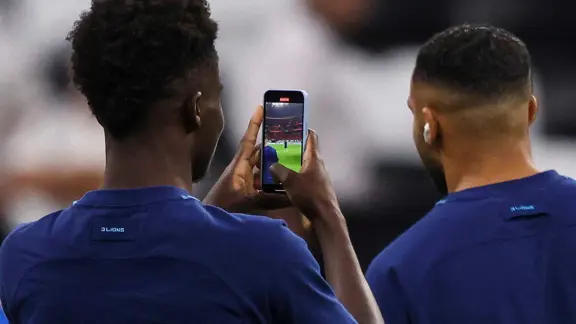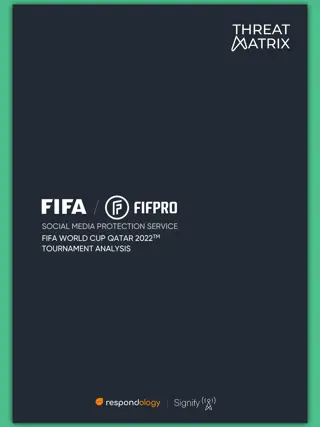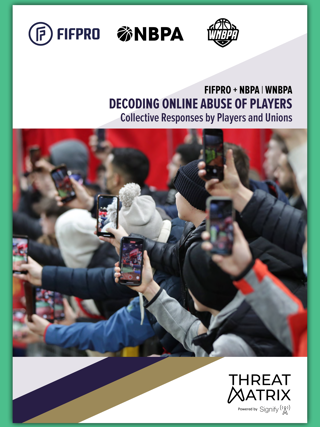News
How FIFPRO is combatting social media abuse of footballers

Footballers, like any other employee, are entitled to the same human rights as anyone else. That includes the right not to be harassed and abused.
With worrying levels of online hate being directed at athletes, which can have a damaging effect on players’ mental health and wellbeing, FIFPRO has collaborated with multiple stakeholders to combat this global problem.
Protecting players at the World Cup, Women’s World Cup
FIFPRO and world football’s governing body FIFA recently released a report into the worrying levels of online abuse aimed at players during the 2022 World Cup based on findings from its social media protection service tool (SMPS).
Last year FIFPRO and FIFA provided an in-tournament moderation service that scanned recognised hate speech and once detected, prevented that comment from being seen by the recipient and their followers.
“It’s hugely important FIFPRO and FIFA are taking action and protecting players on this matter,” said Mark-Anthony Kaye, a member of FIFPRO’s Global Player Council (GPC) who represented Canada at Qatar 2022 and who suffered horrendous racial abuse online after a World Cup qualifier. “All tools should be used to help on this, and finally someone is putting this topic on the agenda.”
The SMPS scanned over 20 million posts and comments on Facebook, Instagram, TikTok, Twitter, and YouTube throughout the tournament. Posts/comments that were confirmed as abusive, discriminatory, or threatening were reported directly to the relevant social media platforms for breaking their community guidelines. In many cases, the offending posts were removed.
Additionally, participating teams and players at the tournament were offered access to moderation software that would hide offensive comments from their pages, with a total of 286,895 comments hidden from public view before the targeted recipient or their followers had to see their contents.
“Social media abuse is very alarming, it’s been over the top of late,” said Kellyn Acosta, a GPC colleague of Kaye’s who represented USA at Qatar 2022. “It's been tough to see whether it's racist comments, whether it's just mean comments, whether it's wishing [bad] things upon us, wishing [them] upon our families. When we're talking about families or something like that, it cuts a little deeper.”
SMPS support will also be provided to players at the upcoming Women’s World Cup, with several teams having already agreed to implement the moderation element of the service to immediately and automatically limit visibility of online abuse.
Player unions taking a stand at domestic level
As the worldwide union for professional footballers, FIFPRO operates on a global scale while its member unions carry out invaluable work for players on a domestic level.
Several unions have implemented solutions to protect players from online abuse, including England’s PFA who ensured clubs created support mechanisms so that affected players were supported from a wellbeing perspective, as well as providing guidelines.
Meanwhile, France’s UNFP and Australia’s PFA have teamed up with AI companies in their respective nations to combat online abuse. The technology scans all posts and comments sent directly to players, filtering out toxic comments such as racist, homophobic and threatening language.
These are just some of the many unions offering protections on the issue. “Online abuse of our footballers continues to be an area of focus and concern for our members and has required a multi-pronged approach involving the leagues, our governing body, clubs and government to address this issue in partnership,” said PFA Co-Chief Executive Kathryn Gill.
A cross-sport approach to a global problem
Relentless online abuse aimed at athletes is not something that is limited to the football world, of course. With many other sports affected by this global problem, FIFPRO has collaborated with player unions from different sports to combine knowledge and share best practice.
Last year FIFPRO, the National Basketball Players Association (NBPA), and the Women’s National Basketball Players Association (WNBPA) released the first international study looking at the nature and level of online abuse directed at professional athletes in multiple sports.
The collaboration of the three player associations represents a commitment to find common ground between the unions and athletes from two of the world’s biggest sports, providing a united front against countering abuse and protecting players.
Decoding Online Abuse of Players details how racism and homophobia accounted for the overwhelming majority of verified targeted abuse towards men’s football players (in 85 percent of cases) and basketball players (74 percent of cases).
Four out of five instances of abuse directed at women’s basketball players included sexually explicit or harassment messages.
Key stakeholders need to acknowledge their responsibility
It is the duty of unions to protect players and ensure their safety. While FIFPRO and its member unions will continue to provide measures to help combat online abuse of players, all stakeholders – social media platforms, clubs, leagues, and regulatory institutions – also need to acknowledge their responsibility when it comes to collaborating on this issue.
Social media platforms especially have a duty to act accordingly – from moderation and protection in all languages to the removal of comments.
“Online abuse is a societal issue and as an industry we cannot accept that this new form of abuse and discrimination affects so many people including our players,” said FIFPRO President David Aganzo. “Several unions have carried out very good work on this topic which, connected to our report launched in conjunction with other player unions, gives us many insights when approaching this matter going forward. Research such as these reports is critical, but it must lead to action to provide prevention and remedy.”
“It’s our job as unions to help protect players by offering them mental-health support,” said FIFPRO General Secretary Jonas Baer-Hoffmann. “We must also impress on social media companies and institutions their collective responsibility to join us in safeguarding players and promoting an online community that fosters inclusion and respect.”


